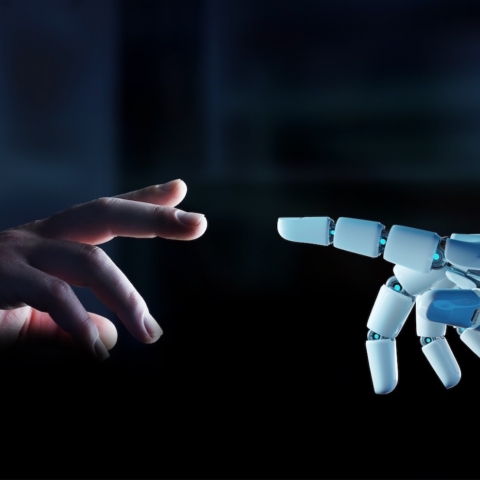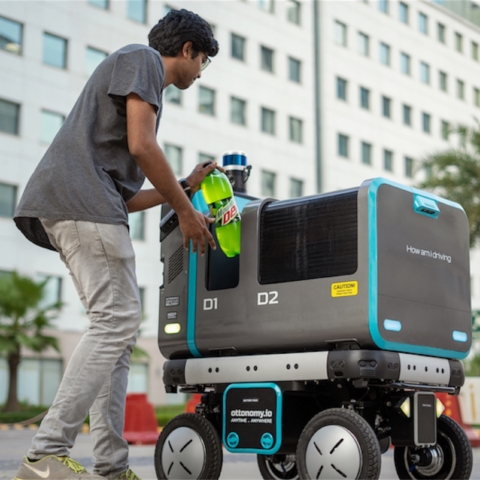Would you like to get notifications from Christian?
It may seem counterintuitive, but embracing the advancements of technology and AI can enhance our humanity. We can focus on developing our unique talents and skills by automating mundane tasks and freeing up our time. As humans, we can adapt and learn, allowing us to evolve and stay relevant in a rapidly changing world constantly.
Embracing technology does not mean giving up our humanity; it means empowering ourselves to reach even more significant potential as individuals and as a society. So rather than fear the unknown future, let's embrace it and leverage technology to become the best versions of ourselves.
Customers

Did you know that a study by McKinsey Global Institute predicts that by 2030, 800 million global workers could lose their jobs to automation? It's more important than ever for humans to focus on developing our unique skills and talents to stay relevant in this rapidly changing world. We can't simply rely on technology to do everything for us.
The future belongs to those who can adapt and thrive in this new era of advancements. Let's make sure we're not left behind. It's time to start preparing ourselves now. Book Christian and learn how you can stay ahead of the game and secure your place in the future workforce.

The radical shift in mindset that we need to adapt to the 4th Industrial Revolution recognizes the transformative power of technology. In this rapidly changing and increasingly complex world, it will be essential for us to embrace new technologies, harness their potential, and use them to drive innovation, collaboration, and creativity.
At the core of this shift is a willingness to learn and evolve and a commitment to pushing the boundaries of what is possible. This means being open to new ideas and approaches, constantly learning and growing, and embracing change as an opportunity rather than a threat.

Augmenting technology is one of the key trends that will shape the 4th Industrial Revolution. This emerging field aims to use advanced tools and algorithms to enhance human capabilities, improve productivity, and enable new forms of work and collaboration. Some examples of technologies that fall into this category include machine learning, artificial intelligence, 3D printing, virtual reality, and blockchain.
These tools have the potential to significantly improve our ability to tackle complex challenges and make decisions in real-time, while also creating new opportunities for collaboration across industries and disciplines. As we enter this exciting new era of technological advancement, it will be essential for us to embrace augmenting technologies as a key part of our toolkit for success.

As we enter the 4th Industrial Revolution, there are several critical skills and talents that humans will need to develop to stay relevant. These include problem-solving abilities. In a world where machines are automatically doing more and more tasks, humans will need to focus on creative problem-solving and decision-making instead of labor-intensive tasks—the ability to work and collaborate across disciplines.
In the 4th Industrial Revolution, professionals will need to be able to work closely with people from different backgrounds, specialties, and skill sets to solve complex problems. This requires strong collaboration and communication skills, an open mind, and a willingness to change.

When you think of a keynote, what comes to mind? A dry, boring presentation that is only useful for corporate types? If so, then you are in for a surprise. Christian Kromme is a Keynote Speaker who will change your mind about keynote presentations. His keynotes are highly visual and engaging, and he can tailor his message to fit any audience.
Whether you need a keynote for a live event or something that can be viewed online or even pre-recorded, Christian has you covered. His presentations are truly inspiring and thought-provoking, and they will open your eyes to the world of tomorrow. If you are looking for a Keynote Speaker who will challenge the status quo and provide disruptive insights, then Christian Kromme is the right choice for you. Contact him today to learn more about how he can help your organization achieve its goals.
Christian is a futurist and trendwatcher who speaks about the impact of exponential technologies like AI on organizations, people, and talents. Christian tailors his presentations to your audience's specific industries and needs.



Our world is changing at an exponential rate! A big tidal wave of digital transformation and disruption is coming at us fast. Many organizations see this wave as a threat and experience stress, but there are also organizations that just see this wave as an opportunity.

Imagine sitting with just 10-15 fellow executives at a premier location, gaining clarity on the impact of AI on your industry while enjoying an exquisite dining experience. These are not just meetings—they are transformative moments that will shape the future of your organization



In the future, 3D printing and generative design will allow for products to be designed in a more decentralized manner, and production will take place closer to the customer and fully on-demand. 3D printing technology will also allow for more customization and personalization of products.


The agricultural industry is ripe for disruption. Robotics, AI, and IoT are all technologies that have the potential to radically transform the way we grow food. In combination with vertical farming, these technologies could increase the efficiency and quality of agricultural products.

A human-centered society is one that puts people first and where technology is used to unite and empower people. It is a society that values biological life and dignity above all else. It is a society that recognizes the importance of human relationships and works to strengthen them. In a human-centered society, all members of the community are valued and treated with respect.


The future of healthcare is here. New technologies like AI, IoT, big data, and smart sensors make it possible to become the CEO of your own health. Imagine that your phone can listen to your voice and AI algorithms can detect small nuances in the tone of your voice that indicate specific diseases.
